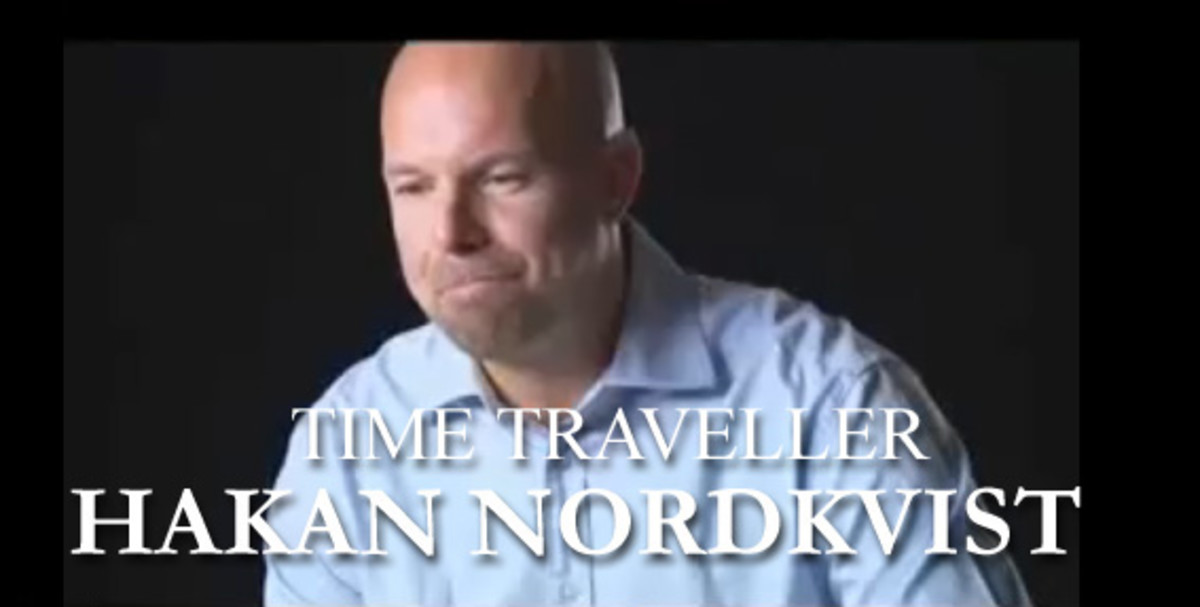How to Make Time for Writing or Art
Beach Stones

Making Time for your Novel
Your novel isn't going to be written overnight.
This article is about making time to write a novel. It could as easily apply to any major project you want to accomplish -- a series of paintings, building a deck, making your own clothes from scratch, learning how to play a musical instrument. You can't just pick a day, throw everything else out of it and focus on getting it done because it won't be done at the end of that day. Not only that, everything you put off to get that day free and everyone that wanted your attention for something is going to be back peeved that you made them wait.
An artist friend mentioned to me that she wanted to get a schedule worked out where everything runs smoothly and she can squeeze everything in. It's the dream of every creative person. How do you make time in your life for your creative work and still have a life?
If your creative work is your full time occupation there's a natural tendency to prioritize it. Success rewards itself. Saying to spouse, kids or housemates "I'm at work now, do you folks still want a roof over your heads?" is a valid argument.
By that point though, most novelists have solved the problem.
A series of paintings for an upcoming exhibition can't get prioritized ahead of commissions for clients who have money in hand. A novel in progress is hard to prioritize ahead of articles that will generate some income immediately or finding a good paid assignment off one of the freelance services. Your novel will not have any external rewards and probably not even much applause and emotional support until you've already gone over this hurdle, finished it, edited it and decided to either submit it or self publish it.
Happily though, the process of making time for your novel may also make it easier to make time for your children or your spouse, work on your garden so you can cut down on the amount of produce you have to buy and whether your house starts to look like a trash midden. It's all part of the same thing, time management.
By choosing to write a novel, you put yourself in the happy position of someone who has to discover how to organize your life.
This is self discovery. This is not something that can be done by the book because everyone's life is different. We do not have a coherent island tribal culture where everyone knows you mend nets at this time of day, go out fishing this other time of day, hang out in the village swapping stories and working on projects another time of day. Life isn't that organized by other people. On some deep level though, most people seem to expect it to be organized by other people. Decide to write a novel and you'll find out fast how unimportant your finishing your novel is compared to their talking your ear off about what happened on TV.
It means taking charge of your life and deciding what you will do with your time. Then being fair about it when it's time to give some of your time to your loved ones and of course accepting that the time you waste at work getting a paycheck is one of those necessities like paying rent is for keeping your housing. Or discovering that your job isn't cost effective as a paycheck-generator and you might do better switching to a different type of work that gives better results for less time and trouble.
If you pulled out everything you own and threw it all in the middle of the living room helter-skelter, the food from the fridge would spoil and drip down into the clean clothes, most of it would get ruined and getting it sorted would mean throwing out most of what was good. So the first step in organizing your time or scheduling your time is to just make a little time for journaling every day to keep track of it. Do that at the end of the day when you know what you did. Don't make plans.
Try to squeeze in working on your novel if you can. If you're organizing before Nanowrimo, bravo! You don't even have to start the book till November, so getting your time sorted out now means that you should jot down times you spend thinking about it, outlining, planning, getting ideas and so forth. You have plenty of time for trial and error to make "work on my novel" a regular event so smoothly part of your life that by the time it rolls around, you never wind up stuck in a time crunch. Or at least they aren't nearly as bad.
But that whole first week is just about understanding what your habits and priorities really are. There are probably things in your life that rate very high on your priorities, maybe top on your priorities, like your children. But you take it for granted that they rate that high and are that important so you might not stop to think "Oh, my children ought to be my top priority, they'll never be this young again." Or you might spend a lot of time worrying about that without actually spending any of the time that you worried about "Am I a good mom/dad" either with the kids or doing anything that would remotely benefit them.
Absolutely, look at the clock and see how long you spent worrying when you fall into worries like that.
Worrying is misdirected imagination. It's the exact opposite of planning. Planning is deciding "I'm going to enter Nanowrimo this year so I need to sort out my schedule to make time for writing about 2,000 words a day during November." That took moments. Maybe even a few minutes of pleasantly daydreaming about being able to sit down to your new novel every day to write another scene or chapter.
Worrying is fussing over whether if you do a novel in November you'll forget to press your trousers and then your mother will give you a hard time about it for days and be so mortified that she takes up an entire weekend berating you about it. No new ideas for how to deal with obvious likely conflicts and troubles come up, the path of memory is so well-worn it's a rut but it can occupy you with assorted resentments and frustrations for hours and hours that could've been spent profitably staring out the window wondering how birds fly or thinking about pirates.
It takes a little self discipline to notice yourself worrying. At this point just try to notice it when it stops and notice how long you spent doing it. This is making a time map of your life. You can't tell where the time you need to write is until you get an idea where the unbudgeable landmarks in your schedule are.
Unbudgeable landmarks may include getting to work showered in clean clothing, getting children fed and off to school, doctors' appointments and so on. They are scheduled already by your other life choices. Then there's a host of things you'd like to get done well and neatly before they really get out of hand, from mowing the lawn to doing the laundry. Then there are all the things you wanted to do and enjoyed as well as working on your novel.
This includes not missing Shark Week on Discovery channel or following your favorite TV shows. This includes family time that's unscheduled but important. Some things come at longer intervals than a week, so don't really count the child's recital as something that's part of a typical week unless your kids participate in so many structured activities that every week you have something child-related that you must attend.
Look at when you went to bed and why, when you got up and why, just look at everything in your life and map it as it is. In that disorganized state, it's not actually as bad as if you threw out everything you own in the middle of the living room and let broken jelly jars drip down onto the easily stained antique rug. It's already organized in a way.
Now cut some time out of things you don't actually owe to other people on the weekend and look honestly at what your priorities shook down to before you questioned them.
This is the equivalent of doing a Deep Cleaning in housekeeping. It's going to take longer, with more time and effort than just maintaining it. If it's done well though, you'll gain the benefit of several months when things go much smoother and life gets easier with more time to spend on things you want and much less time spent on things you resent, none on things you outright don't want or need.
You can look at time like this, you can look at money like this, you can bring that together and make life a lot happier by wasting less of either on anything you don't want or need. The same process and principle can be applied to budgeting too, with great results -- more spending money or savings toward long term goals even if you were already living well within your means. By looking at it before it's a major problem you can refine it to where life's even better.
Keep in mind that "working on my novel" is a type of entertainment that costs time and very little money. It costs the electricity to run your computer and maybe some cheap paper and an ink cartridge way down the line to print it out and send it somewhere. Some publishers take e-submissions. So it's extremely cost effective as entertainment, much more so than cable TV and immensely more than going out to the movies.
That's also a priority to weigh in favor of "novel writing time" when you're balancing it againsnt other enjoyments because that gives a little benefit to the rest of the family and if you have to argue for your writing time, it's one that may carry some weight.
Look at your Time Map and Prioritize
The first glance at anyone's Time Map if they haven't done one for a long time, especially if this is the first time you did one, is amazing. It's easy to identify a whole lot of time spent doing things you don't want or need. Activities that bring no benefit to anyone whatsoever, like worrying, look like vast reaches of time you can seize for your novel and lots of other projects.
The catch is that those things are sometimes bad habits and they take a lot of work to change by successive approximation. Time spent just worrying about things is a killer. This can ruin any life by inches until worrying is all that's on their minds even while they're taking kids to soccer matches, doing the job at work or getting anything else done. It can suck the life out of any life and it's so common, so taken for granted that it's rarely even questioned except when someone starts getting personally critical and puts you down for worrying so much all the time.
Breaking that habit takes understanding what worrying is.
Worrying is misdirected imagination.
It's socially acceptable to worry about things, especially things other people expect of you like whether you're going to pass a test or get a date for the prom or get that project done in time for the boss or get your house clean enough to satisfy your neat-freak roommate or spouse. Everyone worries. People get taught to worry in grade school, it's everywhere. Everyone does it all the time and it's considered mature and responsible to stress out over bills or unfinished tasks and anything short of absolute perfection in all areas of life. In fact, people who are happy and don't seem to have any trouble doing the things they want to do get some nasty jealous comments. They get put down.
You're going to get personally criticized anyway by the vast number of people who go around picking on everyone around them for not doing everything the way they'd have done it. So why not at least get criticized for doing something well and being happy instead of for being a worrier? Seriously, the social consequences of not worrying aren't that big. The folks who criticize are perfectionists and will find a way to criticize anything. They're not fun to be around so if you have no other overwhelming reason to keep them in your life, you might be happier just avoiding them and sticking to people who are more fun to be around because they too are enjoying life.
That's the one avenue of imagination that doesn't get stepped on in school. Everyone nods and understands, yes, you're worried about finals and wondering if you have enough time to study. Or worried about not doing well in sports or whatever.
What is completely unacceptable in school is staring out the window wondering how birds fly or thinking about pirates. School does not prepare children to do any creative activity. It discourages introspection, fantasy and imagination, all things a novelist needs to do the work. The process of socializing people into factory workers or middle managers doesn't allow for anything that's spontaneous, off the clock, original or personal. In most jobs there's a strong pressure against getting personal about anything.
Writing a novel is as personal as it gets. You're opening up the contents of your head, the daydreams you enjoy the most, to share them with other people. Some will enjoy them, some won't like them, a lot of people will be shocked and horrified that you dared even to try because they didn't already decide you were Talented for it. The talent to do it is the desire to do it and the ability to learn all the techniques of how to do it well -- to polish your own daydreams into something so professional and well presented that other people can just pick them up and dive right in for a few hours of relaxation.
Daydreaming is where novelwriting begins, continues and ends. It's all a daydream that you narrate. So to become a novelist, you need to be able to let yourself daydream about cool things that belong in the kind of novels you want to write.
A priority decision to turn any "worrying" time into "developing ideas for my novel" time is a habit to change gradually over time. Count every single time you do that as a success. If you think of something awful that could happen to you, imagine that as part of a novel and make it lots worse, as much worse as you can imagine. If you're worried about whether the pots on the stove could cause a kitchen fire -- get up, clean them or toss them in the sink and while you're ding it, imagine your characters dealing with a three-alarm house fire and losing everything they own. Daydream the exciting scene of them trying to rescue each other, maybe some of them are trapped inside. This is novel material. Good stuff.
It would actually fit into any genre there are novels, since even the most realistic novels do have house fires or accidents that tear up characters' lives and may kill a character or two. So have at. Enjoy it as a fantasy. Think it through and jot it down in the big Ideafile of "cool things that could happen in a novel."
I don't worry much because I spend a lot of time thinking about cool things that could go in novels. It's a lot more fun and it does wonders for reducing my stress levels in life. Occasionally novel characters will solve something that bugs me and was on the back burner, because I kept throwing nastier versions of it at them and some hero who's much smarter and wiser than I am dealt with it in a genuinely effective way.
So: All worrying time is novel-planning and idea generation time. Just keep something like a notepad on you to get the ideas down so that you don't lose them. If you pay attention to each idea as it comes, you'll see the really good ones come up again and again till you know what belongs in the plot of your specific novel.
Now let's look for some other time sinks.
Arguments. Most people who live with other people spend enormous amounts of time arguing over day to day living stuff -- about money, about who cleaned what and who's on their butt all the time watching TV, about what to eat, about what to do in shared time and how to spend any spending money. It seems to be socially acceptable to try to take charge of what everyone in the family is doing and get your way every time on anything that isn't necessity. Most people don't play fair in these arguments either.
Sorting that out isn't something you can just decide to do. It is something that can be kept to a reasonable amount of time though if you decide to reschedule them. What makes it work to say "I will talk about this with you later when I've cooled off, say, after the kids have gone to bed," is to have the nerve to go face the conflict at the time you said you would. That has to be practiced a number of times before the people you argue the most with can trust that you will actually take the time to hear them out when you said you would.
Then listen, try to see it from their point of view and don't blow up back at them. When dealing with your own anger, cool off and prioritize it for how important it is before saying anything. Then stick to that issue and try to pick a time when they're not trying to do three other things. Consideration in arguing is also a good strategy for getting what you want.
Call it whenever an argument turns circular. "We've had this same argument eight times, I don't see how it can turn out any different. We disagree. Let's just accept that and try to work out a reasonable compromise."
It's a sign of healthy relationships if the arguments that come up are always new and interesting rather than a rehash of all the old ones. That's a huge waste of time in itself, one that few people enjoy or want to have to put up with.
So cutting down on the time spent arguing about things by being generous on anything that doesn't matter much to you and being firm about holding boundaries without trying to control what those other people in your life do or scheduling their time is a way to bring "arguments" within reason. So is scheduling a time for clearing the air, that works for some families and not so well for others. There are various strategies.
Treat "dealing with conflicts" as a necessity in life and don't waste time avoiding them, since the resentment built up by just dodging the arguments can create so much dramatic tension and suspense that your life could become more unpleasant than your main character's. That just isn't right. The novelist is supposed to be enjoying a soft life out in the real world where ninjas don't drop down the chimney all the time and life goes at ordinary scale. It's protagonists that have to be keyed up to the point their psyches shatter in all those interesting directions.
Household maintenance/Activities of Daily Living.
This has everything to do with mowing the lawn, doing the dishes, getting the laundry done, that sort of thing. It becomes an enormous source of arguments since no one is ever satisfied that it's being done right, the way it's supposed to be done, on time and the way they like it.
Volunteer for doing the laundry. Put your hand up for that one when the chores are being sorted, because it's one of the activities easiest to integrate with Novel-Writing Time. Bring your laptop down to the laundromat or laundry room and pound keys while the machines do the work. During the bit of it that involves putting the clothes in, show a bit of care and consideration -- separate darks and lights, remember if someone is allergic to X detergent and use what doesn't make them itch, fold it and sort by whose it is. If you put a little consideration into how you do the laundry, everyone in the household will be happy you're doing it and leave you alone to do it well. You will get noveling time.
Look at the other household chores that get shared with an eye to which ones can be done while working on your book. This is a biggie. It may actually cut down on the arguments in itself, if it doesn't, then sort that out at the scheduled sorting-out and point out what you're actually doing for them in exchange for the things they do for you. Few writers live alone where it's possible to decide to streamline all activities of daily living to get the most results with the least effort, so getting along with the people you live with is part of getting it done with less time wasted arguing about it.
If they want specific things done, like a special fabric softener or whatever, ask about it during the sorting-out and write it down. Getting used to doing it their way when it's not something emotionally important to you becomes you being considerate and easier for them to live with.
A lot of things can be solved with this type of strategy. Look over all the possibilities and filter it through "what would give me some writing time?"
#7 for my HubChallenge

Other Time Sinks
Some things on your first Time Map are going to shock you. They'll become easy choices to make because they're not demands that people who are emotionally important to you made on your time or ways that your boss impinges on your time at home, there's no one to resent but yourself. It's a goofy stupid horrible feeling to recognize that you watch three hours of television shows you don't like in order to enjoy two that you do like while skipping the gap between them.
The solution to that one is Tivo or buying the two shows you like on Amazon so that you spend that hour of watching two half-hour favorites together and just don't bother scheduling according to what the ratings say everyone else does. Buying your TV online or prerecording it can save so much time it's an enormous personal decision. It can do a lot for any life, not just a novelist.
Another solution is to recognize it and turn those two shows with their gap into cues for writing time. You know when Show One is over that you have blocked that evening free. You settle into working on the book. You know your writing session will be over when you hear the intro music of your second show. Ignore everything in between and work on your book. If your family likes some of those in-between shows this can be a good solition.
Communicate clearly to them that while you're working on your book, you don't want to be interrupted to see that funny commercial or hear their opinion on a show you're not watching. This is a bit harder to do diplomatically, sometimes it's easier to leave the room so you don't give the appearance of being out there snubbing them. If they get used to your paying attention to the book and not the TV, then that can work -- but if there are constant little conflicts, it probably comes off like you're telling them they're not important to you and it's better to just not be there looking like you don't care.
Sorting out communication issues is one of the biggest parts of living well -- and for writers it's why some of the less sensible time sinks come up at all.
Others happen because people in school get taught to just do what they're told. This includes "buy this body spray so that girls will like you" even if you're a teen boy who already has a girlfriend and she actually said she didn't like that scent.
There is this thing the Hindus call "mindfulness." Living in the moment, dealing with reality as it is, focusing on the here and now, the people you're with, the thing you are actually doing. It's very hard to maintain that all the time, day in and day out. Most of life consists of habits, the mind is free to wander while the old tape plays of how to say hello to a new coworker and what to think of someone dressed like that and to look straight forward in the elevator instead of embarrassing the people next to you by looking at them.
It is structured by other people.
It has inertia because habits make life easier. Because it's too easy to run yourself into the ground worrying about everything from the state of the economy to whether the bus will crash or that irritated looking person across the bus is looking at a bit of food on your chin. Not paying attention to everything in life, having whole areas of it sorted out and turned into routine frees up time and emotional energy.
Paying attention to every single decision in life consciously, deciding it fresh, takes an enormous amount of work and thought. This is why doing a Time Map and making major decisions about what to do on it isn't some quick and simple answer to sorting out your life. It's the start of a practical one. It is also a task as difficult and all-absorbing as deep cleaning your entire residence and deciding where everything gets put so that it's easier to find when needed and out of your way when not in a way that looks attractive.
There are completely pointless time sinks. You may want to take the phone off the hook during scheduled writing time. Scheduling writing time may make it easier for the other people in your life to know when not to bother you with anything that isn't a true emergency. Blood, fever over 100, heart attacks, immanent eviction or burglars are true emergencies. This works for many writers, maybe even most.
Give some to get some. That means letting go of them when they want to do something stupid and pointless that you don't enjoy doing, whether that's playing computer games or sorting and looking at vacation pictures, hobbies you find dull and stories about people you never met that you'd rather not given the contents of the stories.
Time management always sounds so simple and sensible in a good article about it.
There's an old anecdote about the rocks, the pebbles and the sand that my artwork up at the top illustrates. If you have a peanut butter jar and you want to put this big pile of rocks and pebbles and sand in it, put the biggest rocks in first. The pebbles will drop in around the big ones. Pour in the sand and the jar is actually full.
If you live alone and you are the only person who decides anything in your life, that can work right on the first go. You can decide that you're not going to watch as much TV or watch anything other than the few particular shows you love, catch them on Tivo and get them all in together on an evening set aside for relaxing with TV or spread them out an hour a day, thus having far, far less time soaked by the picture-box than most Americans can manage. You can decide to get your living space ruthlessly organized, buy containers, sort everything out exactly as you want it and put it all away cleaned and neat, then maintain that cleanliness with a lot less time and work than either living in a sloppy mess or clearing it periodically would take.
You can work all that out to your satisfaction perfectly, budget for yourself and make decisions without hesitation.
When you live with other people, their priorities aren't yours. So making time for any time just to yourself may seem selfish to them if they're being denied your company exactly when it's convenient for them. If they're angry it seems like you don't care about them at all if you'd rather work on your novel than stop to get yelled at right now for what they're mad at you for.
Time management in a life that has other people in it does not mean you have to take over the family and make everyone else's decisions and priorities on the basis of what serves your novel best. That's a way to become the fabled Control-Freak Ex and hear nasty anecdotes about yourself from everyone who used to be your friend while your ex takes most of your possessions and income.
It means paying attention to their real needs, desires, habits and priorities and putting them on a level where you can reasonably negotiate some time to yourself for working on your book when they know you're busy, like you were at work. If they go invading your work time phoning you at the job to tell you about how angry they are that you forgot to do something they expected done, they're starting to get unreasonable and that's time for a serious sorting-out about priorities because they've just put the fight on a higher priority than paying the rent.
Necessities really are the big rocks. Some form of income has to be brought in to pay for housing, food, clothing suitable to go to work and an entertainment budget. Try to be fair on budgeting time and money while not caving in to irrational demands. Most people grow up thinking that the process of getting what they want must involve a lot of bickering and haggling, that if you gave in too easily they could've got more of what they wanted.
So getting along with the people who are important in your life is a matter of looking over your Time Map to see what really happened.
Come up with a good plan that's reasonable and fair to everyone.
Test it out. Then look at where it crashed, because what other people say their priorities are and what they really are doesn't always match. The process of reorganizing your time to make time for writing is going to put everyone in your life through some major changes.
Now here's some good news.
The first go at the Time Map is also going to identify time sinks that really aren't important to you. People who pester you but do not have any valid right to claim that much of your time. Casual acquaintances you don't even like who are pushy and may keep you in IM or on the phone for hours going on about something you find dull. Activities you used to enjoy and keep up out of habit that you're not really getting anything out of.
Knock those right out of it. Ease off on them. Start making polite excuses. Cancel out well in advance if that's at all possible so that the people who still care about that other thing you used to get into so much have time to get someone else to handle your responsibilities in the club. That leaves the door open if you want to take it up again. Most people accumulate a lot of trivial social responsibilities -- if commercials can make people buy products they don't like and want, the power of friendly familiar real people asking for a minute of your time for something good and important has a thousand times more validity.
Become cautious about making commitments. Look at them and what time you really have before signing up to help out on some planned activity. "Wish I could, but I'm really backed up right now" is an acceptable thing to say.
To live well anyone needs to be able to say No when people ask for things that sound reasonable and aren't. The pushier they are, the likelier it is to get dragged in on the grounds that you can't think of a good way to refuse -- and that invites the pushy person to decide what your priorities are, especially if they reject your reasons.
That's telling the boss "No, I can't stay late tonight, my wife and kids have something planned and I've already put it off twice." The boss may not like that but if your job is so shaky that saying no to any demand for overtime is going to get you tossed overboard, maybe what you need is a steadier job with saner hours. It's telling people who want you to join a new club they're organizing that you don't have time for another activity, even though you like them. It's making choices of what to do with your free time.
That takes being able and willing to draw a line and recognize those choices are yours. Otherwise you'll be overbooked before you blink, no matter who you are. Writing a novel could be the catalyst to reclaim your life for yourself and your closest loved ones.
So don't short them out but don't expect to give them every minute of every day not spent earning money for the household either. That road lies resentment. If you don't get to recharge and sort out who you are and what you want in life, eventually there comes a time when everything's too much. They don't even all agree on what they want you to do anyway when there's more than one of them.
If you keep your word when you give it and hold off on giving it unless it is something that important, it's much easier to gain their real trust. Real trust means if you say "How about getting together on Saturday to sort out what to do about the chores" and actually show up ready to calmly negotiate chores instead of accusing everyone else in the family of not doing theirs and dumping them on you, they can trust that your diving into your novel doesn't mean you don't love them or care about what they need.
Relationships are strained when anyone makes big personal changes. The more you can do to ease the strain on the people around you, the easier it will be to make time for anything at all, especially long term like a large project. If they're also interested in doing Nanowrimo, that's great, then you can start bringing in mutual support and cheering-on as things to do with your family, turn writing time into a write-in, find other ways to make it fun.
Don't take charge of their time. Don't critique their time management. Expect to let go of little things, a lot of them, if it's not important to you then it's negotiable and you could get something much more important to you like writing your novel blown off as less important to them than your mowing the lawn every week or doing your turn at fixing or clearing up after dinner.
You can try to coordinate this organizing by discussing it with others in your household. If they are interested, having a discussion of the things you all want to do together is a possibility.
One thing that I noticed about budgeting applies to time sorting-out too. It's much easier and more enjoyable to plan in a way that gives some extra and then spend happy time fantasizing about what to do with the extra than it is to face it as a desperation move when ends don't meet. The big decisions are the ones that'll make ends meet. Dropping an entire activity in favor of another one can be a big decision making time -- and swapping out "computer gaming" for "writing time" is less likely to offend your loved ones or give them the idea that time is now up for grabs for you to do whatever they want.
If you don't have any time in your schedule that you get to decide what to do with it, that is something only you get into or enjoy, there may be something going very wrong in life. Usually that turns out to be some difficulty saying no or just that everything took a lot longer than planned.
However long it takes to do something, what works is to give a good estimate of how long it takes to finish and take into account everything that could slow it down or go wrong.
Then triple that good estimate and it'll be spot on.
So if you need an hour to write a thousand words, plan for 1,667 words a day as if you need to give four hours to your novel for each day's writing. Yep. You'll finish faster and that will also account for things like the day you went to the dentist for that toothache you weren't expecting, the dog sicking up on the rug, your kid sicking up on the rug, the car breaking down, the overtime, unexpected guests, the great movie you waited years for it to come out that everyone enjoyed... you get my drift.
That's the thing that breaks most time schedules as surely as money budgets -- they don't get set up to be reasonable or sustainable. They either blithely assume everyone else in your household's going to cheerily leave you alone to do things your way in your time without a fuss or that nothing unexpected ever happens. Most of the time it does. Plans are only sketches. Life fills them in with real things happening.
You can identify and eliminate time sinks in your own habits easier than anything to do with what other people are doing because you are the one who decides whether to worry about whether you're going to get fired or worry about whether your hero's going to get out of that burning building with the kid alive. The latter is much more fun and even profitable with enough practice. The former doesn't actually save jobs.
Some good times of day to work on books: when everyone else is busy, sleeping or quiet. Getting up an hour ahead of everyone else in the morning is a strategy many writers use. That way by the time they get up, that hour's worth of writing is already done. Or stay up an hour or two later. Don't do this to the extreme and cut out sleeping to meet social obligations and family demands on time, but it's good for an hour or two a day.
Give yourself writing time when the other people you live with are at work or school, when they're busy doing something else. That's when to either do chores that can be done concurrently with writing like laundry -- kill two birds with one stone -- or just focus on writing first and do some chores when they get back.
Putting a little time into planning activities of daily living around times other people aren't around may help you do them in ways that take less time and work. Most times people learn to do this stuff from their parents, who may not have been very good at it or who may have been so good at it that they never explained how it came together so well but they always got much better results. Guys especially may have been raised by mothers who did so many things for them right up till they hit adulthood that they don't know how to buy groceries or clean a house unless they join the military.
So don't hesitate to ask a military friend to come through and assess your housekeeping. You might be surprised at how much simpler the process can get if it's done brute simple and practical without any fuss. Maintaining things like that is always easier than letting it go till it's unmanageable. That's guys and housekeeping. So women must be lots better at living on their own, right?
Not necessarily. They can wind up going out in life with no idea how to fix a broken toilet, spackle a hole in sheet rock, fix an electrical outlet or a broken appliance. They may have learned in school how to sew a dress or cook for a party but have no idea how to buy in bulk for cheap and sort a food budget without relying on packaged stuff. People's life skills vary a lot and the real experts on Living Well are rather rare. What happens instead is that parents pass on the habits they live by, which were haphazard, and then that gets filtered by gender in a lot of homes so that both kids go out into the world with only half a set of life skills anyway on the vague hope they marry someone competent in the other half.
Some things can easily go by the wayside in family traditions is that if gardening was women's work in his family and men's work in hers -- then both of them look at the weeds and the pretty magazine covers as total duffers and at best decide to pay a landscaper to do it. It can happen easily because a lot of Activities of Daily Living drift by inclination. The partner who really likes gardening is the one who does it and the other one's relieved of an unpleasant chore. No one says this and the kids grow up thinking it's someone else's job.
If no one wants the job, consider eliminating it or at least reducing it as much as possible. Maybe even if it'd be a good idea to grow your own vegetables to save money, no one in the family actually likes grubbing in dirt, planting and weeding and it'd be cheaper to find a good farmer's market to buy local produce direct from the producer while getting the kid next door to mow the lawn for a few bucks -- and spend that time doing wildlife activism since everyone cares about that and actually enjoys it. Even going green involves some choices on that level. It's not like it means an absolute dedication of every part of your life to the cause.
It means looking over your life and doing all the easy changes first.
Learn to hang up on telemarketers fast. They're better off if you do, they can call someone else and might get their quota. Learn to turn off the TV when it's boring. In most people's lives this is the biggest, ugliest time sink of all. Those aren't even real people whose feelings will be hurt if you miss that sitcom. They got paid. They went home happy. If you don't think it's fun, don't waste your time on anything that was supposed to be entertainment in the first place.
If you prioritize your time, money and attention by what you need first and then what you want, being careful to give decent priority to things the people you love want to do with you, then it's possible to let the small stuff take care of itself. It always does. Necessity first should give you some free time, if it doesn't, then life is in the middle of a looming crisis that needs a more drastic solution like changing occupations or moving somewhere less expensive.
Then out of that free time that's left after necessity, some of it rightly belongs to the people you love. If every bit of the time spent with your loved ones or housemates is miserable and resented, then you've got bigger problems than time management and maybe a good marriage counselor or different roommates would be important before your life turns into unmitigated nightmare. You should after sorting out some reasonable time spent with them and doing things they want, have some time of your own that you decide what you want to do.
From there it's a matter of prioritizing your novel and putting it in the jar first ahead of other hobbies. This works if it's your artwork you're prioritizing or anything else.
What happens after doing this a few times is that you find out what the small stuff and the big stuff really is. It's easy to over and underestimate what time and attention things take. The first time you reorganize and schedule writing time will probably have a dramatic effect. Nothing like cutting back on TV to make writing time.
It should be repeated several times a year like deep cleaning the house because that's how a club you joined on a casual interest wound up taking more time in your life than your novel or your family because the organizer is very good at reminding you about every little meeting and activity going on. The small stuff adds up, squeezes itself in on other people's enthusiasms and if you don't maintain an awareness of where your time goes, it'll get that bad again in about half a year to a year as everyone wants just a minute of your time.
Once a good schedule and a set of habits is established, it's easier to maintain than it is sorting it out in the first place. It takes three weeks to create a new habit if you do that in a way that it'll stick. If it didn't work after three weeks, try something else because something you didn't think of while planning is conflicting with it. This is why repeating a Time Map exercise several times a year really helps -- as it gets more refined, your results are cumulative.
You don't wind up going back to five extra hours of boring TV every weeknight if you figured out that it was really that you need to sit still for a couple of hours after work and did your novel writing before anything good came on, and so on. The solutions that do work stick. The ones that don't need to be reexamined to find better ones that will stick. Each version that you come up with becomes a little more sustainable and comfortable until your life fits you as well as the jeans you bought last year and went swimming in.
No matter how good any plan for living is, it's not going to compare to the plan that's been tested again and again by the conditions of your real life. It won't fit you as well as it does the hypothetical average person. Things will change around you.
Time will open up when small kids go to school. Time can shift around if you or your partner changes jobs. When there's a major life change, reevaluate everything to see what else has to move around to accommodate it and don't forget that your novel's a priority.
So think about Time Management as something comparable to Deep Cleaning and remember -- it worked if it gets a whole lot easier a month after you did it. Otherwise it needs to be looked at again in light of what really happened.





